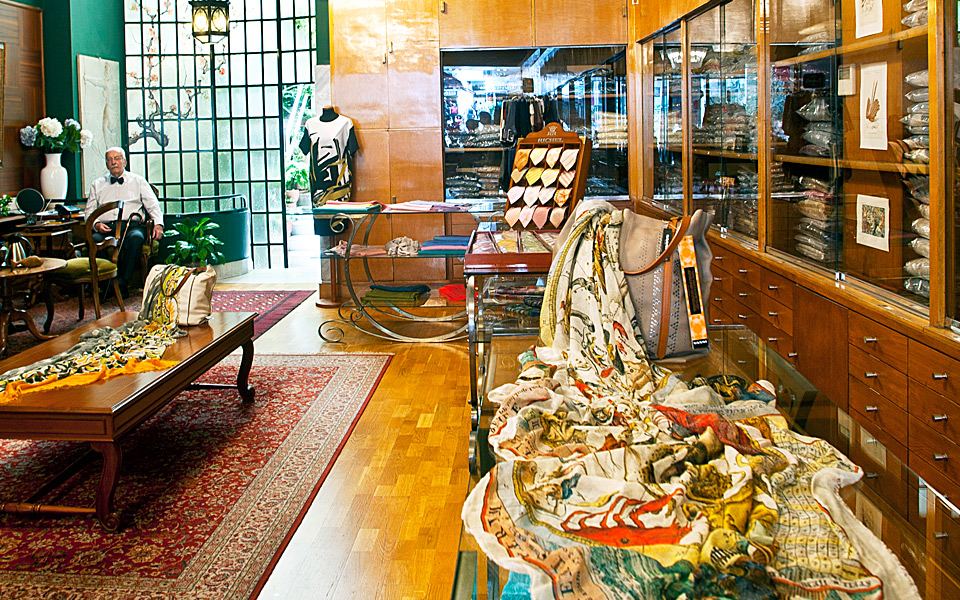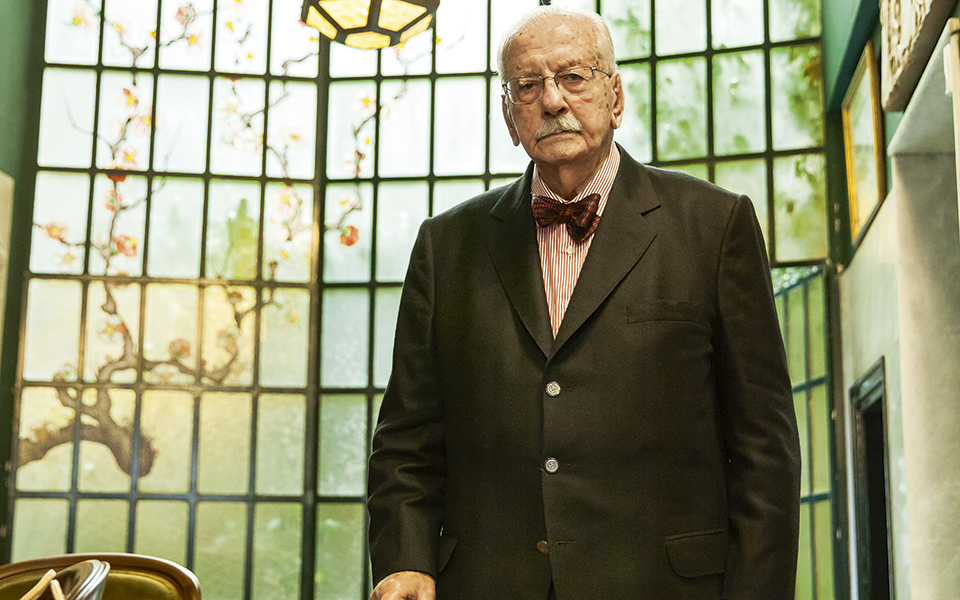The tip of his fountain pen made a small loop in mid air, as if to rehearse before landing on the paper to sign his name: Eftychios Alexandrakis. I couldn’t help but think how many times in the 70 years he has owned the shop selling high quality women’s clothes on the city’s main shopping street, Ermou, he must have drawn this signature. On order forms, inventories, letters and cards; albeit at a time when honoring one’s word carried far more weight than any written contract.
Now, just before seeing me off, he was writing an inscription on the first page of a book with drawings by his brother Alexandros, famous for his vivid depictions of the Greco-Italian front in World War II. We paused at the door: “What is the most expensive piece of clothing?” I ask. “It is manners, child,” he replies without hesitation. “One may be wearing a well tailored suit, but without manners, one is naked.”
We had spent an hour in the total calm of the shop, the oldest building on Ermou Street, and a landmark in its own right. The assistants were chirping away quietly next to the shop window as we sat at his desk at the back, under the gaze of his parents looking down on us from a portrait painted by his brother. His father, Dimitris Alexandrakis, who had left the island of Amorgos to come to the city, had seven children: six sons and one daughter. The youngest, now standing tall at the age of 96, is still the epitome of elegance. He is wearing a well-knotted polka-dot bow tie, an impeccable white shirt and black suit jacket. His shoes are as shiny as the handle of his walking stick, and the corners of his neat moustache lift slightly when he smiles. When I called to ask for an interview his response had been: “From Kathimerini newspaper, you say? Please, do come. I am not just a reader. I am a follower!”
Can you fit a whole life in a short narrative? In good shape with a methodical mind, he is making small chapters as he speaks. He remembers his childhood in Athens, his WWII service on a British destroyer on account of his language skills, the bombing of Piraeus, his service in the Greek army during the Civil War. “I’m often asked what I make of Greece and the crisis,” he says suddenly turning to the present. “My generation saw much worse. We shouldn’t lose heart. What we should do is see how we can get back on our feet. This is the only thing we should care about. I think that what we are now lacking is faith in our country. On the day war broke out in 1940, men were rejoicing in the streets; they were ready to go and fight. My mother sent six sons to war without being particularly vexed. We all came back safe. This is what is missing…” And he adds: “We have lost our sense of duty. And our decency. Because decency is a duty, you know…”
“We have lost our sense of duty. And our decency. Because decency is a duty, you know…”

His father bought the business at 27 Ermou Street in 1907 from one Karyofilis, who had founded the company in 1860. He used to work for him. “Karyofilis wanted my father to marry a relative of his. He would have given them the shop as a wedding present. But my father had already met my mother – she also came from an island, Andros – and they had fallen in love. He took good care of her; he himself chose her clothes till the end of his life. You wouldn’t find a speck of dust on him. As a father he was strict; he never pampered us. He was a man of principle, a man of his word, and his character had won him everybody’s trust. This is how I raised my daughter, too; and this is how she raised my grandson – he is now in the States studying. We were taught to respect our principles. And what pains me is to see the country no longer respecting principles, and other nations no longer having respect for the country…”
We are looking out the window at young people in jeans and trainers parading up and down the paved street. I find myself tempted to ask about elegance. He cuts me short: “Elegance equals simplicity! Oh, and one more thing! Many women are slaves to fashion. The latest trend doesn’t necessarily match everyone’s personal style. A woman needs to know what to buy. She shouldn’t let herself be carried away,” says Eftychios Alexandrakis remembering his own wife: “She would always wear clothes she looked good in. You need to be sensible to be well dressed. And then there is also posture. When you stand poised and straight, clothes look good on you. Posture is very important. There was a time when people knew all about poise and bearing, then that, too, was lost.”
“Come, let me show you around,” he suggests proudly rising from his desk. “All this merchandise you see here has already been paid for. And it is a good thing that we own the premises, and that we are well trusted by our foreign suppliers. It allowed us to get through the capital controls. As a businessman, I believe our biggest mistake all these years was too much government interference in the economy. This is no way to move forward. It makes me sad to see business so slack in the shop. But then I remind myself I have no debts, and that I have seen worse. I know decent people who can no longer go out for an evening; they have to stay in to make ends meet.”
We are moving up the floors among elegant furniture, expensive carpets and beautiful paintings. Every so often, he will stop and lift the silver handle of his walking stick to point out a woman’s suit, a coat, a shirt, a sweater. “A fine piece of clothing speaks to you. Touch it! You’ll see!” he tells me caressing a camel coat. We move on to the dressings rooms. “Please, tell me: how can you buy clothes when you cannot even fit in the dressing room. Dressing rooms are so small these days! How can you possibly try on the clothes? You can tell a good shop even by the storage space and staff kitchen. See how clean everything is? Each time there are riots my heart sinks. God forbid anything should happen to us.”
“Ermou is my second home. My father used to say that you can move house as often as you wish, but the shop needs to stay at the same address. And I am here, too; every day, from morning to closing time.” He walked me to the door and accompanied his farewell with a slight bow of the head, a small, manly gesture echoing days long gone.
To be published in Kathimerini’s K weekly magazine.
“Ermou is my second home. My father used to say that you can move house as often as you wish, but the shop needs to stay at the same address. And I am here, too; every day, from morning to closing time.”











